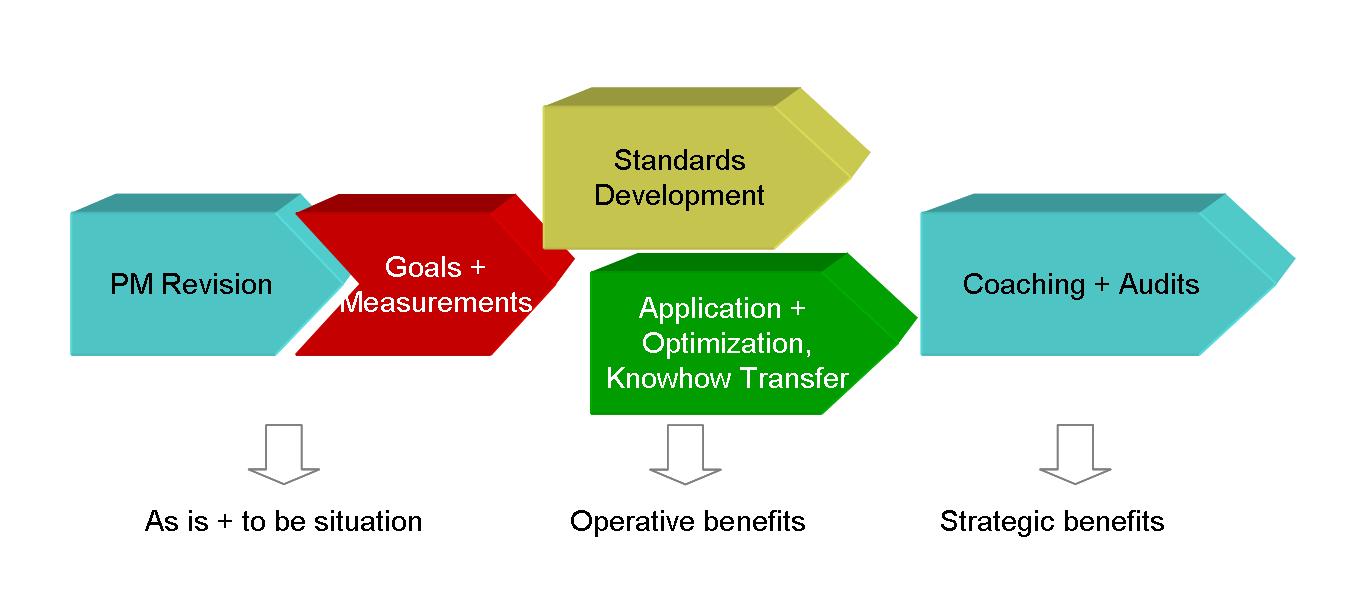Sir Winston Churchill is quoted to say „Some think education is expensive – think about incompetence and ignorance!” Looking at billions of Euros in project budgets every year and still more than 50% of projects failing or achieving their goals only with significant deviations from plan, I feel reminded of these word. And of my “Mission” to implement Operational Excellence in my customers’ projects and project organizations.
It’s a fact that many executives know well about the benefits of good project management, but they do not invest in this skill and its availability in their companies accordingly. Surveys show that still PM is often done as shared time on top of normal duties. Most project managers have immense project experience but no formal PM education, and therefore practice project management within the horizons of their own experience.. This makes project results very individual, as well, and very difficult to calculate. As said: At nearly 50% of projects their value depreciation starts even before the first invoices are written…
 A representative case from my professional practice
A representative case from my professional practice
The situation described above was the starting point of an initiative I was called to advise on and supervise some time ago. The organization delivered brilliant results from the technical point of view, but starting and controlling projects was always a struggle. The management was drowned with all kinds of reports and formats and lacked sufficient information resulting in continuous bad surprises.
We started with an assessment of PM practices at the project ground level through a series of interviews with the project managers and the teams and comparing with the perceptions of the management. Relative quickly we discovered that the teams suffered most from re-inventing the PM wheel with each new order and from pressure that started already at the beginning of almost every project due to insufficient time for proper set up and planning activities. Many basic flaws which infected the whole courses of the projects could be traced back to these findings. The resolutions depended on the project managers’ individual tool boxes and authorities.
Resolution was unexpectedly quick and easy
It didn’t take long to discover 9 major systemic issues in the PM organization to address, nor was it a big effort to convince project managers and teams to contribute to the resolutions which would undoubtedly ease their lives.
Without going into details: We collected all available PM knowledge and successful PM practices that were hidden on diverse laptops, together compiled a standard set of processes, tools and templates needed in all projects. We additionally started an organizational change initiative to implement a framework of roles, responsibilities and PM infrastructure at the corporate level to support project management. The fact that we did this in a joint effort with all players from the project organizational level prevented us from creating unnecessary overhead and promoted buy-in.
The effort was developed incrementally in an “agile” way, so the teams and managers benefited from quick wins with every delivery that was immediately used in the current projects. The initiative, on the other hand profited from experiences made through practical usage, so that it took little  time to optimise the results against the requirements of the people and organization. We built our own, consistent way of operational excellence in the organization’s projects. In that phase my role was merely as facilitator and coordinating supervision of the initiative, which was evolving self-dynamically. Everyone involved, from team throughout to management level enjoyed the progresses and know-how transfer adding value to their own skills and personal successes. The projects finally showed better results emerging with increasing delivery to plan and decreasing write-offs, stress and overtime.
time to optimise the results against the requirements of the people and organization. We built our own, consistent way of operational excellence in the organization’s projects. In that phase my role was merely as facilitator and coordinating supervision of the initiative, which was evolving self-dynamically. Everyone involved, from team throughout to management level enjoyed the progresses and know-how transfer adding value to their own skills and personal successes. The projects finally showed better results emerging with increasing delivery to plan and decreasing write-offs, stress and overtime.
What’s next?
In the coming year a further building block initiative is planned to hand over the maintenance of achieved results back to the company and, under the responsibility of the QM department, further development within the organization, including a rendering into the wider enterprise context. I will accompany this as coaching and with regular audits to assure project management operational excellence and quality is maintained. The HR department has been tasked to arrange PM training for the staff, and a group of employees will probably set up a shared service as a Project Office to support the running projects.
To refer back to Winston Churchill: It seems a company can never invest more operational excellence in projects, than it profits from the benefits: efficient and effective resource usage, less risk, conflicts and cost, better achievement of targets and schedules, and consistently reproducible project successes and results… Not to talk about better customer satisfaction and the image gain compared to competition from the new and reliable competences.
Read more about this topic – click here …
